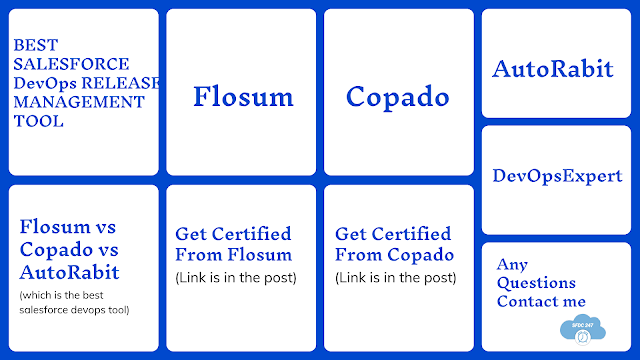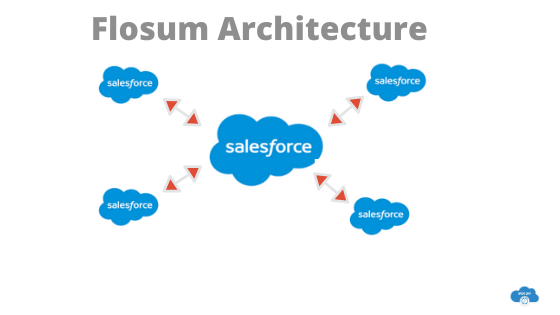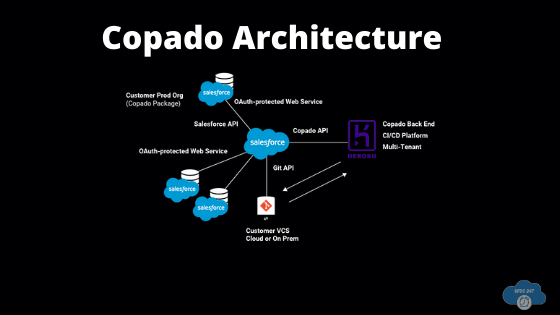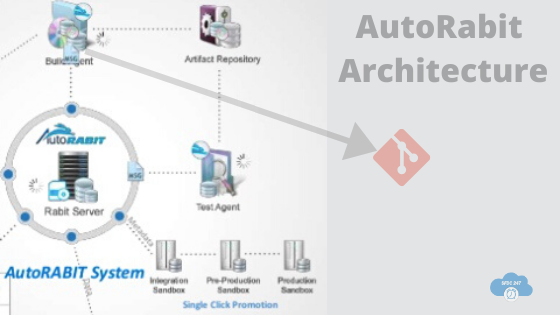Are you still using changesets or you have moved from changesets to salesforce ant migration tool? Salesforce has again introduced SFDX which supports the source of truth known as Git. Are you using SFDX or still planning to move ahead of salesforce DX to salesforce app exchange products. If yes, then you have come to the right place and I will introduce you to 3 major competitors of salesforce release management which gives you end to end salesforce release management solution to your needs.
I have a lot of experience of working with each of these tools and I must say that each one of them is full of amazing features. So, today, I am not going to dig in detail about each product because it would require a lot of commitment to do it, but I would share my knowledge on why each one of them is unique in itself.
Also Read: https://www.sfdc247.com/2020/03/An-Ultimate-List-Of-Top-200-Plus-Salesforce-Blogs-On-Web.html
Just to let you know each one of these tools is capable of performing below tasks and works similarly but in a different fashion.
1. All of them are complete IDE
2. CI/CD Pipeline
3. Integration to other tools Velocity, Jira, TFS.
4. Org Comparison
5. Data Migration (Dataplier(Flosum), DataLoader Pro(AutoRabit))
6. ALM Solution
7. Running Automation Scripts
8. Static Code Analysis (PMD, Codescan, Checkmarx)
This list will not end and it will go on and on… But the point of this article is to give you what precisely you look in a complete DevOps tool and what feature makes this tool different than others. When someone asks me which tool do you like among the three of them, I will say it depends on clients to clients and person to person what additional feature he needs in a tool. Let’s cover each one of them in little more detail
Flosum:
It is the most simple UI based and a complete end to end salesforce release management tool which only trusts salesforce and have a large set of integration with other third-party tools when compared with Copado and AutoRabit. The features which I like about this tool and none of the other tools are capable of doing this is its NATIVE VERSION CONTROL Feature.
Native version control is quite similar to git but it is quite advanced than git when you think in terms of release management solution. I am quite amazed how they did it but it’s certainly a feature to look after when you are comparing with AutoRabit as well as Copado.
Secondly, you can also integrate it with GitHub, BitBucket, Gitlab, Azure etc. but having its own git tool isn’t it great. Think in this way, you don’t have to pay a single penny to GitHub, BitBucket, GitLab etc.. because Flosum is a git tool in itself. Yes, you can integrate with other tools it’s your choice.
Thirdly because of its native version control feature the deployments are quite fast when compared to Copado as well as AutoRabit.
Lastly, Flosum is capable of doing all the integration which is there in the marketplace and if you have any specific requirement with respect to salesforce that can be done by Flosum experts, in order to give you an example when I was working on its product I had a requirement to integrate VS Code which was quite specific to us and they were able to do it within a short span of time.
Architecture Of Flosum: As you can see from the below diagram, salesforce is installed over salesforce it means that it is completely built on salesforce and adhere to all SOX Compliance.
From there Linkedln Page I found that they are organizing Flosum Learning Certification Programme:
If you are someone interested in becoming Flosum certified, we have some upcoming certification opportunities for the Professional Level. You may register using the links below:US/Europe Registration:Asia Registration:
Connect With Flosum: They have really good reviews in the app exchange marketplace if you want to connect with them use this link https://appexchange.salesforce.com/appxListingDetail?listingId=a0N30000000psM0EAI
Copado:
It is a little complex when compared to Flosum and also a complete end to end salesforce release management tool which only trusts salesforce. But what makes this tool different from other tools is its Application lifecycle management which is quite similar to Agile Accelerator of salesforce labs but quite more advanced. The order in which Copado deploys user stories is based on its User story reference which creates a feature branch from the master and when you deploy it to salesforce it will again create a promotion branch to deploy the metadata components which are linked to user stories.
Secondly, you can also integrate it with GitHub, BitBucket, Gitlab, Azure etc. but having its own ALM tool isn’t it great.
Thirdly, Copado back promotes and deploy feature is good as long as you know what is pipeline manager. Once you are able to create pipeline design it becomes relatively easy to back promote deployment. The same can be accomplished with Flosum as well as AutoRabit.
Lastly, Copado is not good in terms of rollback but if you know how to design your pipeline then you are in good hands of Copado, but if something breaks in production and you need to revert changes in a second then you have to follow a standard process of creating hotfix branch and then deploy changes which I believe is time-consuming.
Architecture Of Copado: As you can see from the below diagram Copado is built on salesforce and interacts with Heroku using Copado API.
From there academy page I found that you can get certified using the below link.
Connect With Copado: They have really good reviews in the app exchange marketplace if you want to connect with them use this link https://appexchange.salesforce.com/appxListingDetail?listingId=a0N3000000B3dgGEAR
AutoRabit:
It is more complex when compared to Flosum as well as Copado. If you are working on a project then you must and should hire a release manager who can support this tool. But, why this tool has gained its popularity even though it does not have its own Native Version Control nor its own ALM Solution.
AutoRabit is famous because it comes in two variants one is on-premise and other is cloud version. The on-premise feature gives you more flexibility and control over your tool as compared to cloud version and you can deploy metadata components using their single revision or release label, commit label features.
Secondly, you can also integrate it with GitHub, BitBucket, Gitlab, Azure etc. but having its own on-Premise tool isn’t it great.
Thirdly the rollback features in AutoRabit is good as long as you click on checkbox “backup” but it is not good when compared with Flosum as it automatically takes rollback of metadata components.
Architecture Of AutoRabit: As you can see from the below diagram AutoRabit is built on rabit server but it also interacts with AWS in the backend. The rabbit server interacts with salesforce instance as shown in the below diagram.
Connect With AutoRabit: They have really good reviews in the app exchange marketplace if you want to connect with them use this link https://appexchange.salesforce.com/appxListingDetail?listingId=a0N30000000ptkwEAA the cost of using there license what they have mentioned on App-exchange is not correct, I believe they have not updated it correctly. As far as I know it quite costly than Flosum or Copado.
Summary About Flosum Vs AutoRabit vs Coapdo
To summarize I will give you overall tools comparison in one single table.
| Tools | Flosum | Copado | AutoRabit |
| Full Native Version Control | True | False | False |
| Copado Native ALM Solution | False | True | False |
| On-Premise Installation | False | False | True |
Question: I don’t want to work with repository tools and need a complete salesforce release management tool which takes care of my deployment and it should be fast, easy and user-friendly–> Flosum
Question: I need a copado native ALM solution to deploy my changes and it should be inbuilt with the managed package –> Copado
Question: I need an on-premise instance to work with the tool and deploy changes –> AutoRabit
There are many other factors that you can compare within these three tools but at the end of the day everything should be deployed successfully in production and you should also have the capability to rollback deployments in case something goes wrong in production.
Flosum Vs AutoRabit Vs Copado The Best Release Management Tool
I am working on these three tools from many years and seen a lot of changes in each product with every major release. Taking all my personal experience, I would say that I like all three of them but if you ask me one specific tool among these three then my best release management tool is Flosum.
#Note: Nobody has asked me to promote these tools, I am sharing my experience what I had in past.
If you would like to know more about each tool with respect to your project and having trouble in understanding what each feature does with respect to each tool, I can guide you and clear all your doubts. you can always comment and contact me from our contact us page we will try to answer your queries as soon as possible and in case you have any suggestion on how to improve my website page, do reach out to me.
We also write product reviews on the tools and if you have any product that you would like to get reviewed you can always comment, contact me via Contact Us Page and I will reply back you immediately 🙂
#Note: Publishing this content anywhere without the consent of SFDC247 will result in a lawsuit against copyright infringement




Nicely done sir. Very informative for someone who is exploring for the first time regarding release management tools.
Just one note- the link to flosum Certification is broken. Hope you will fix it soon.
Interesting article; though, needs to be updated. It is a good start, but one should do their own due diligence (RFP) from the perspective vendors as features have changed ( added).